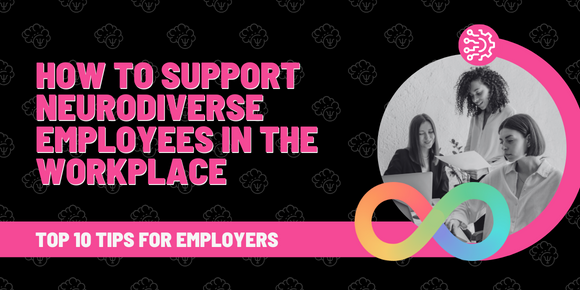
1. Ensure inclusive practice begins at the recruitment level
The journey to a supportive workplace starts with the recruitment phase and inclusive hiring practices. Adjustments such as making questions available ahead of time, sharing an itinerary and directions (if an interview is at an office), creating a welcoming environment free of too many stimuli, and being transparent about the next steps will mean that the playing field is levelled for all applicants.
2. Create clear policies enabling employees to access adjustments or support
It’s important to recognise the spectrum of neurodiversity and outline support mechanisms in business policy. A survey from Birkbeck University found that 43% of neurodivergent employees are likely to leave their current role. This number drops significantly when tailored adjustments are made – having a supervisor’s support, psychological safety, career satisfaction, and tailored adjustments all reduce the likelihood of attrition.
By offering support in an open and accessible manner, for both those with and without an official diagnosis, you will foster a more inclusive environment for staff.
3. Be led by your employees
It’s important to recognise that neurodiversity is a spectrum and that support needs to be tailored accordingly. Managers can support employees by opening up dialogue with employees to discover what they find most challenging and how they can overcome this. One example of a reasonable adjustment would be to not schedule last-minute meetings with that employee, another may be to provide notes with clear actions after a meeting.
Speaking on the importance of personalised strategies, Code First Girls ambassador Daniella Polor said that she had benefited from “extra time to complete tasks, extra breaks when I feel overwhelmed and additional equipment to aid me in my daily tasks”.
4. Promote flexible working
Companies that embrace flexibility – be that hybrid working, amended hours to accommodate energy peak or role flexibility – will enhance employee well-being and foster a community of trust and autonomy. For Code First Girls ambassador Asia Sharif, support came in the form of prioritising work earlier in the day: “I struggle to concentrate and only work under pressure. I have had to tell my manager the times I perform my best and do all my demanding work early before I crash in the afternoon.”
Give neurodiverse employees an environment that complements their unique strengths and working styles and unlock another thriving member of the team. For example, JPMorgan Chase’s Autism at Work programme found that autistic workers can be up to 140% more productive than neurotypical employees if they’re matched to the right job.
5. Run company-wide neurodiversity training
Neurodiversity training in the workplace and an inclusive ethos should be a company-wide priority. This can be achieved through education given to all staff members on what neurodiversity is and how to champion it. Not only will this inspire an inclusive environment but it will allow employees to feel like they can be themselves at work.
Speaking on the need to champion neurodiverse employees, Ian Baynham, Accessibility Network Co-Chair and Engineering Manager, Flutter UK & Ireland, comments the following: “As someone who is Neurodiverse, and co-chair of our Accessibility Network at Flutter, I’ve seen firsthand how embracing our unique perspectives leads to real innovation and growth. Through flexible working, empathetic communication, and inclusive hiring, our employees are not just supported but are also valued. It’s clear to me that our neurodiversity isn’t just welcomed, it’s celebrated as a source of strength and inspiration, allowing everyone to thrive.”
6. Be mindful of the risk of burnout
According to our recent community survey, nine in ten neurodiverse women had experienced burnout, with factors such as sensory overload and the energy required to hide certain traits in the workplace, being attributed to this high figure.
Speaking on this challenge, ICT Lecturer and CFG Ambassador, Claire Evans says: “Commuting and being around people every day is constant hyperstimulation for me, which leaves me drained and exhausted. Sadly people don’t understand how badly I’m affected.”
To mitigate burnout in your teams, provide regular check-ins, ensure the workload is manageable and provide mental health services to all.
7. Set up a support ecosystem
Equip neurodiverse employees with mentors to support them in navigating career progression. Our recent community survey uncovered that neurodiverse women were 1.2 times more likely to still be at a junior level than their neurotypical counterparts. In order to support all staff to break through that glass ceiling, it’s important that employers provide mentors to help neurodiverse people navigate office politics and decode career progression opportunities.
Speaking about the importance of neurodiverse mentors in the workplace, CFG Ambassador Panagiota Konstantino says: “The fact that my manager confided he also has dyslexia without phrasing it in a way that made it sound like a problem made me more confident to disclose it to him as well.”
8. Rethink leadership metrics
Due to outdated work practices, many women fear the impact that disclosing their neurodiversity will have on their career goals. Such as this anonymous member of the CFG community who said “I don’t want my potential at work to be curbed by the perception that I might not be able to cope with ‘too much’ work or responsibility”
It’s time for conventional leadership evaluation criteria to evolve from being personality-based to becoming led by skills so that it creates pathways for neurodiverse talent to thrive and assume leadership roles because on merit and competency.
9. Champion neurodiversity in the workplace
It’s time to celebrate the unique strengths that neurodiverse employees can bring to the table. Whether it’s hyperfocus, resilience, or the ability to be highly self-reflective, organisations must champion what makes neurodiverse people such brilliant employees and uplift their teams. Not only is this likely to encourage employees to work at their best but will foster further diversity. This becomes increasingly important when you consider the known benefits of harnessing diversity in business such as:
10. Promote universal design
Organisations should look at cultivating an inclusive work environment with universal design in mind. This involves supporting all to do their best, regardless of whether or not they have a known disability, using the tips outlined in our most recent report.
“I have been branded difficult or picky due to my traits, such as needing to clarify intent in messages or meetings, and clarifying actionables to ensure I don’t miss anything. I’ve been branded as anti-social and rude because I can’t handle meals with my team after a 10-hour day in the office. Simple requests like sharing the schedule for events ahead of time are ignored.” – QA Engineer and CFG Ambassador, Adelaide Baron
By embracing the tips outlined above, organisations can harness the power of neurodiversity, decrease employee turnover and increase job performance.
Check out our most recent report The Power of Difference: How Tech Companies Can Support Neurodiverse Employees for more in-depth insights into how to transform workplace culture, as well as insights from our partners such as GCHQ with how they’re utilising diversity to keep Britain safe.
- Target Keywords: supporting neurodiversity in the workplace (KD 28%)
- neurodiversity training in the workplace (KD 21%)
- neurodiversity in business (31%)
- neurodiversity training (23%)



